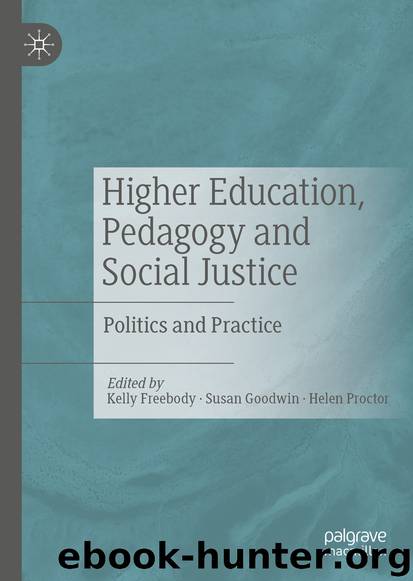Higher Education, Pedagogy and Social Justice by Kelly Freebody & Susan Goodwin & Helen Proctor

Author:Kelly Freebody & Susan Goodwin & Helen Proctor
Language: eng
Format: epub
ISBN: 9783030264840
Publisher: Springer International Publishing
Storytelling Practices in Mental Health Contexts
A significant contribution of narrative practices in mental health contexts has been their potential to shift the parameters of what is conceptualised as acceptable or legitimate knowledge about emotional distress. This offers a sharp contrast to the mental health diagnostic paradigm, in which service user perspectives are subsumed into preconceived illness categories, or worse still, viewed merely as further evidence of illness (O’Hagan 2014). For example, Romme et al.’s (2009) book, Living with Voices: 50 Stories of Recovery stands out from the mainstream literature on mental illness for not only drawing upon the voices of people with lived experiences of voice-hearing and for claiming that recovery is possible, but also for examining a broad range of non-medical approaches to managing distress. Hall’s (2016) collection, Outside Mental Health, includes over 60 contributions—many written by people with first-hand experience of mental health interventions—that offer a diverse array of alternative understandings of distress and pathways for understanding ‘recovery’ outside of medical discourses. Hall’s suggestion in the book’s introduction is that the collection should not be viewed as an attempt to replace the medical model, but to redress the unchecked power currently given to medicalised understandings of distress, which drowns out other knowledges.
Nevertheless, despite the important inroads made possible by narrative practices, critical perspectives on storytelling processes in mental health have noted that merely drawing upon first-person accounts does not necessarily lead to transformed understandings. Rather, in many cases, service user narratives are invited into research and practice contexts, only to be re-interpreted according to the dominant medical paradigm (Cohen 2015). By way of example, mainstream representations of postnatal depression may use women’s own words to describe emotional distress following childbirth, but they rarely include representations of the social contexts such as divisions of labour or gendered power relations that women may also consider to be important in making sense of their experiences. The selective use of women’s voices and knowledge is likely to lead to strengthened notions of ‘illness’, the role of ‘expert helping professionals’ and an understanding of distress that represents the ‘problem’ as located within individuals. Other critical voices have noted that service user narratives can be used to focus on making only minor changes to psychiatric practices—leaving the status quo comfortably in place—at the expense of a much more ambitious agenda that “changes the world into a fit place for us to live” (Curtis, Dellar, Leslie, and Watson in Costa et al. 2012, p. 87). Storytelling can be hazardous, too, by affecting current and future employment opportunities, or by requiring people to revisit harm without offering an opportunity to redress the injustices that have been experienced. In addition, Fernandes (2016, p. 3) argues that storytelling practices can invite complacency, through the construction of “easily digestible soundbites” that are often highly moving, but overly simplistic—focusing too heavily on individual experiences rather than accounting for the structural causes of despair. These are some of the complexities and tensions I was interested in exploring as part of a combined research and education project, entitled Making Things Visible.
Download
This site does not store any files on its server. We only index and link to content provided by other sites. Please contact the content providers to delete copyright contents if any and email us, we'll remove relevant links or contents immediately.
| Administration | Assessment |
| Educational Psychology | Experimental Methods |
| History | Language Experience Approach |
| Philosophy & Social Aspects | Reform & Policy |
| Research |
The Art of Coaching Workbook by Elena Aguilar(51162)
Trainspotting by Irvine Welsh(21643)
Twilight of the Idols With the Antichrist and Ecce Homo by Friedrich Nietzsche(18622)
Fangirl by Rainbow Rowell(9229)
Periodization Training for Sports by Tudor Bompa(8254)
Change Your Questions, Change Your Life by Marilee Adams(7759)
This Is How You Lose Her by Junot Diaz(6877)
Asking the Right Questions: A Guide to Critical Thinking by M. Neil Browne & Stuart M. Keeley(5759)
Grit by Angela Duckworth(5604)
Red Sparrow by Jason Matthews(5467)
Paper Towns by Green John(5179)
Room 212 by Kate Stewart(5105)
Ken Follett - World without end by Ken Follett(4723)
Housekeeping by Marilynne Robinson(4436)
The Sports Rules Book by Human Kinetics(4379)
Papillon (English) by Henri Charrière(4262)
Double Down (Diary of a Wimpy Kid Book 11) by Jeff Kinney(4261)
The Motorcycle Diaries by Ernesto Che Guevara(4089)
Exercise Technique Manual for Resistance Training by National Strength & Conditioning Association(4061)
